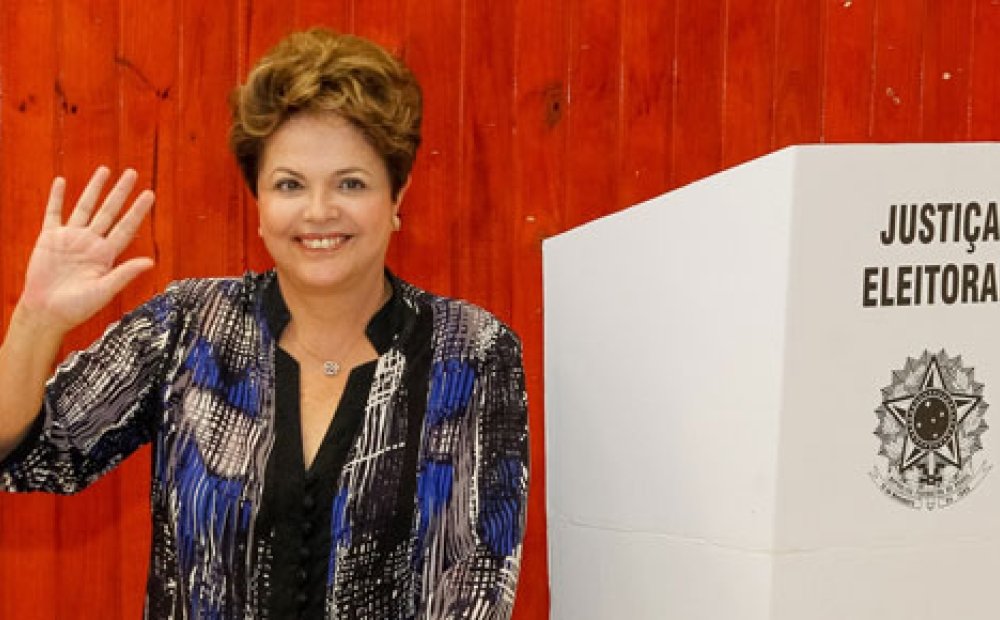Brazil’s Challenging 2013 Outlook

As the administration of President Dilma Rousseff struggles to reverse the trend of declining rates of economic growth in an adverse global scenario, Brazil’s domestic outlook in 2013 will be impacted by the consequences of two major political events - municipal elections that took place in October and the Federal Supreme Tribunal’s unprecedented hearings of the largest political corruption trial in the country’s history, which concluded with guilty verdicts for 25 of the 37 people indicted. On November 20th, the Brazil Institute convened a panel of experts to analyze and give insight into the landmark events and assess political and social outcomes for the upcoming year.
David Fleischer, professor emeritus at the University of Brasilia, offered an overview of the elections of mayors and city council members in Brazil’s 5,568 municipalities and analyzed trends that emerged from the polls. In the first round of vote held on October 7 the turnout of over 140 million was 7.2 percent higher that of the previous elections held in 2008. The number of female candidates running for office also increased in the mayoral campaigns by 2.5 percent over a four year period, resulting in more women mayors in Brazil. Compared to 503 females that were elected in 2008, 674 will take office on January 1, 2013, or 12.2 percent of all mayoral positions. However, there was a significant decline in the number of female city council members elected, falling from 8.9 percent of the total in 2008 to 5.2 percent in 2012.
Another trend noticed by Fleischer, as well by other speakers, is the continued electability of incumbents. A majority, 67.5 percent, of mayors running for reelection in the largest cities were given another term. Within parties, 75 percent of those elected belong to seven parties, six of which have dominated mayoral races since 1996. The rise of the Social Democratic Party (PSD), led by the outgoing mayor of São Paulo Gilberto Kassab, was seen as not significant politically, since most of its members came out of the Democrats, formerly the Party of the Liberal Front, which has declined.
Fleischer concluded by highlighting the political rise of governor Eduardo Campos, from Pernambuco, whose Brazilian Socialist Party (PSB) was the most successful at the municipal election. One of the parties in the coalition that supports Rousseff, the PSB elected 440 mayors into office, a 46.87 percent increase from 2008-2012. The 48-year old Campos has emerged as a presidential contender in 2014 and/or 2018 along with senator and former governor Aécio Neves (PSDB) from Minas Gerais.
Clifford Young, managing director for Ipsos Public Affairs Polling, outlined major factors behind the voting patterns in the elections, starting with the importance attributed to quality of life issues by Brazil’s rising middle class, especially those emerging from the so called C class. While unemployment used to be the leading concern, it has been superseded by education, access to health care, and crime/public security. Young noted that growing number of people within the C class, from 34 percent of the population in 2005 to 54 percent since 2003, totaling over 40 million.
Turning to the mensalão corruption scandal and trial, and the role of corruption in the eye of the public, Young said that there are two perspectives. In the short term, it produces negative effects, such a general disenchantment, with politics. The longer term effect is potentially more positive, because the episode keeps the issues related to fairness and personal integrity of elected officials high in the public debate and tends to mobilize those engaged in working to promote de rule of law in a fairer and more equal Brazil, said Young.
Young touched also on President Dilma’s reelection chances in 2014, given current favorable electoral sentiment she enjoys. Young noted that as an incumbent, the next election will likely be a referendum on her. Assuming she will be a candidate, he suggested that despite recent bad news in the economy, she has been able to maintain a high approval rating. Focus groups, specifically within the C class, suggest that she benefits by a sense of optimism generated by the rise of income levels among the formerly poor. Dilma is climbing in the polls because she is seen as a decisive person with a strong record on fighting corruption. According to Young, if elections were held now, the Brazilian president would have a 90 percent probability of winning a second term.
Matthew Taylor, assistant professor at the School of International Service at American University, and author of a recently publish book on corruption in Brazil, Corruption and Democracy in Brazil: The Struggles for Accountability (University of Notre Dame Press, 2011) described the mensalão scandal as a watershed moment in in Brazilian history and an affirming moment for the authority of Supreme Federal Tribunal, Brazil’s supreme court (ST). He noted that the high court did not nudge in its role in convicting 25 of the 37 defendants, and it asserted the independence of the Judiciary branch of government. While underlining the significance of Court’s decision on the mensalão, Taylor noted that Brazilian courts remain the biggest bottleneck in the fight against corruption. The increased awareness of the public to issues related to ethics in government and public life in general and the rise of the role of civic organizations in the fight against impunity has given a further and much needed push for judicial reform. While the STF continues to be plagued by an overburdened case load of over 100,000 cases a year, Taylor said that its verdict on the mensalão was a landmark moment. While it may not necessarily create new momentum for major judicial reforms, the case has created a sense of hope about the continued democratization of Brazilian society.
João Castro Neves, an analyst at the Eurasia Group, focused on the socioeconomic aspect of the municipal elections and in Brazil’s direction in the future. Echoing Young, he emphasized that the entire political agenda was being reshaped by an emerging and growing middle class.
Castro Neves noted, however, that the economic output and demand of the emerging middle class are constrained by the current economic realities. A renewed focus is placed on transportation, infrastructure and the growing energy demand, as well as on demands for more and better education and health care. Brazil could be on the verge of shifting its growth pattern, which remains slow. Predicting a 3.4-4 percent growth for next year, he noted that the pace of economic recovery will be a critical variable to determine the policy reaction of the administration in terms of a reform agenda. Inflation, which has been inching up, will be closely watched. According to Castro Neves, Dilma’s popularity, despite a decreased economic output, is explained by higher income, lower unemployed and lack of meaningful opposition.
Drafted by Michael Darden, Program Assistant, Brazil Institute
Edited by Paulo Sotero, Director, Brazil Institute
Photo courtesy of Blog do Planalto
Speakers



Senior Director, Global Strategic Risks at ExxonMobil

Hosted By

Brazil Institute
The Brazil Institute—the only country-specific policy institution focused on Brazil in Washington—aims to deepen understanding of Brazil’s complex landscape and strengthen relations between Brazilian and US institutions across all sectors. Read more
